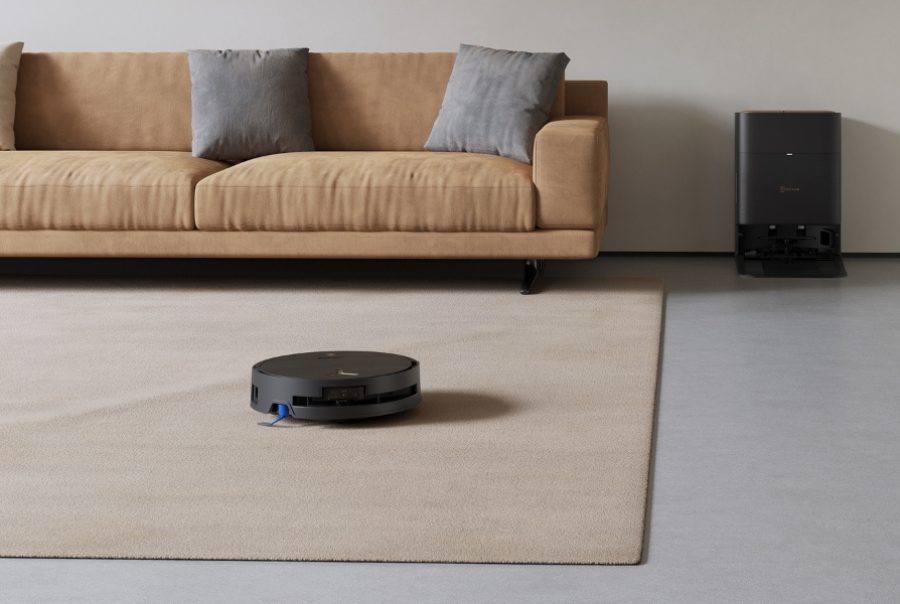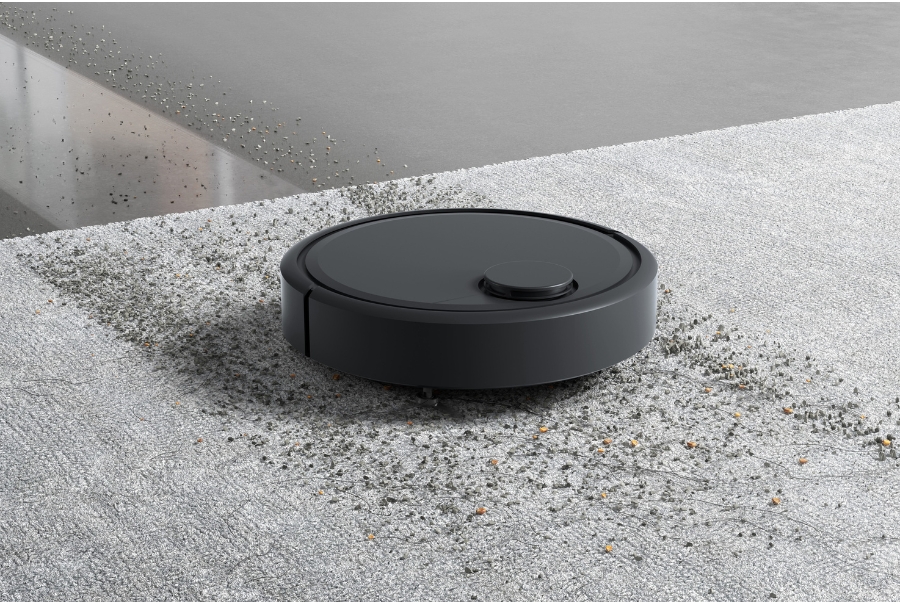Can You Vacuum at Night?
2025-06-13

After dinner is done and the house quiets down, the chores begin. For many, late evening is the only moment they can clean. But is vacuuming at night really okay? Noise complaints in apartments and townhouses are more common than you think. The US Federal Noise Control Act of 1972 provides a general guideline, but most cities and towns have their own ordinances that define what sound levels can land you in trouble. Generally, quiet hours start at 10 pm, meaning a loud vacuum cleaner might not be worth the risk. Don’t worry, with the right quiet settings and smart features, you can still vacuum at night.
Can You Vacuum at Night?
Yes, you can vacuum at night as long as your vacuum cleaner has the right features, with quiet mode being the most important. While the local rules may vary, they usually limit sound levels to 50 decibels or below between 10 pm and 7 am on weekdays, and until 9 am on weekends.
In apartments, thin walls and shared ceilings turn mild noise into something everyone hears. If your cleaner roars while someone’s trying to sleep, it might come off as rude and inconsiderate. You may have more freedom in single-family homes, but be mindful of your kids, partners, or pets.
A robot vacuum's navigation can also have trouble at night: a low light environment can interfere with those that rely on bumper sensors or camera mapping. Premium models like DEEBOT robot vacuums, on the other hand, are designed with laser-based mapping and obstacle detection that don’t rely on light. You can also precisely assign cleaning areas and schedules on the ECOVACS Home App, allowing the device can run quietly at night without manual effort. Still, it's best to schedule vacuuming outside quiet hours when possible.
Why Choose a Quiet Vacuum?
The biggest concern of vacuuming at night is the noise. Besides waking someone up, it can stress pets, interrupt work-from-home workers, or ruin the peace of a late evening. Choosing a vacuum cleaner with quiet mode is a great move if you can only clean at night, letting you stay on top of floor care without disturbing the household.

A quiet vacuum provides various benefits to your home:
Clean Anytime
Quiet vacuums give you more freedom to clean whenever you like. Whether it’s just after dinner or well into the night, you can do a quick sweep without worrying about the decibel levels that a vacuum cleaner produces. It’s perfect for night owls who still want to stay on top of dirt buildup; even better, smart models like DEEBOTs let you set specific cleaning zones and schedules in advance via the ECOVACS Home App, so there’s no need to get up or intervene during quiet hours.
Pet-Friendly Operation
Pets and vacuum cleaners don’t usually get along; loud suction sounds can scare cats and make dogs anxious. A quiet vacuum reduces stress and your furry friend can stay relaxed while you clean. Pet-friendly smart vacuums such as the DEEBOT T50 PRO OMNI come with ZeroTangle 2.0 Anti-Tangle Technology, featuring triple V-shaped brush designs that prevent pet hair from getting caught, and minimize sudden noise spikes that could shock sensitive pets.
Perfect for Apartments and Shared Spaces
Living in apartments or shared spaces means thinking about more than just your own comfort. If your cleaner sounds like a jet engine, it’s likely your neighbors will hear every pass through the thin walls. With quiet vacuums, you can clean your flat in the evening without worrying about complaints. For instance, a quiet robot vacuum like the DEEBOT T50 PRO OMNI operates at just 63 dBA.
Less Disruption for Work-from-Home Households
When someone’s on a Zoom call or wrapping up late-night emails, the last thing they need is a roaring vacuum in the background. Quiet mode makes it easier to clean while others are still working.
Improved Focus on Other Tasks
Whether someone’s reading, studying, or trying to watch a movie, low-noise vacuum cleaners are less likely to ruin the moment. In a respectful way, you can tidy up without pulling people out of their focus.
Ideal for Elderly or Sensitive Individuals
Older family members, babies, or sensitive individuals might find loud vacuums overwhelming. To show your consideration, use a quieter machine to create a calmer living environment and make cleaning feel less intrusive.
Better for Daily Maintenance
When vacuuming doesn’t sound like construction work, you’re more likely to use it regularly, helping you manage dust and allergens before they build up. Frequent vacuuming means less deep cleaning later and fewer sneezes triggered by allergens, keeping your home feeling fresh all the time.
To keep your vacuum cleaner quiet and working properly, it is recommended to maintain the machine on a regular basis. After powering down the device, use a damp microfiber cloth to wipe the exterior and empty the dustbin. Then, inspect the filters, suction heads, brush rolls, wheels and charging points for debris or tangles. Rinse the filters and other washable parts, let them dry thoroughly before reinserting. Also, clean any docking or storage stations to prevent bad smells or blockages. With consistent upkeep, your quiet vacuum can last much longer.
8 Best Tips for Vacuuming Effectively at Night
Want to clean up without waking everyone? Our experts give these tips to help you keep your home clean while maintaining a peaceful atmosphere.
- Choose a vacuum cleaner with quiet mode: Look for models with a dedicated quiet or eco-cleaning mode that produce noise around 60 to 70 dB. Keep in mind that acceptable noise levels may vary depending on your local ordinances.
- Close doors and windows: Contain the sound by shutting doors and windows in the room you're cleaning. This also helps prevent noise from travelling to your neighbors or housemates.
- Prioritize rugs: Thanks to their sound-absorbing materials, vacuuming carpets and rugs typically generates less noise than cleaning hard floors. Their fibers also trap dust and debris easily, so keeping them clean helps freshen up your space quickly.
- Avoid vacuuming near shared walls or bedrooms: If your neighbor’s bedroom is right behind the wall you’re cleaning, consider tidying other rooms at night and save those areas for daytime.
- Sweep the floors first: Using a broom to remove large crumbs or dust is much quieter than vacuuming. Sweeping first before vacuuming helps limit the vacuum’s noise impact.
- Choose the right time: In most US cities, quiet hours start at 10 pm. Try to vacuum before then to stay within the local noise rules. For DEEBOT users, simply schedule cleaning sessions in advance through the ECOVACS Home App.
- Shorter Vacuuming Sessions: If you start cleaning late, focus on quick spot cleaning like spills or crumbs instead of vacuuming the whole place. Short sessions are more considerate of your neighbors.
- Move Quickly but Efficiently: Don’t drag the vacuum across the floor, as that can create unnecessary noise. Use a slow, steady pace for better results and a quieter experience.
FAQ
What time is it acceptable to vacuum?
While local rules across different cities in the United States, it’s generally acceptable to vacuum between 7 am and 10 pm on weekdays, and from 9 am on weekends. Be considerate of your neighbours and avoid vacuuming during quiet hours, especially in apartments or shared housing with thinner walls.
Is it illegal to vacuum at night?
Vacuuming at night isn’t technically illegal, but it may violate noise ordinances or tenancy agreements; as a result, you could face warnings or fines. For instance, the NYC Noise Code considers it a violation if noise exceeds 7 dB(A) above ambient levels between 10 pm and 7 am, which includes vacuuming. Fines can range from US$350 to US$4,200. The code targets “unreasonable noise”, so if a vacuum is used in a way that causes excessive disturbance during restricted hours, it could result in a summons.
Can I vacuum early in the morning?
Vacuuming early in the morning, say before 7 am, may go against local quiet hours. Check your building or local council rules, and use a vacuum with quiet mode to help minimize disturbance.
Can a robot vacuum avoid obstacles at night?
Yes, many robot vacuums can avoid obstacles at night using infrared sensors, LiDAR, or 3D structured light. These technologies don’t rely on visible light, allowing the vacuum to navigate and detect objects even in dim conditions.
Related Products









